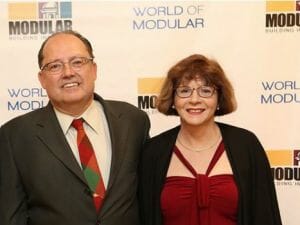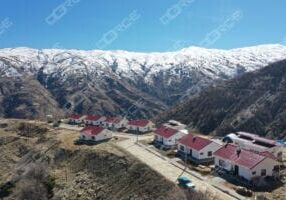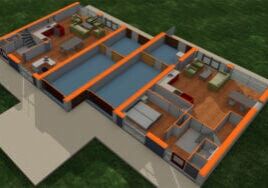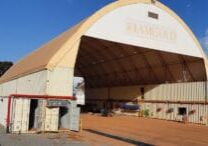New Off-Site Construction Course Reflects Growing Interest in Modular Construction in Brazil
Ralph Tavares has over 35 years of experience in the modular construction industry. He’s been a member of MBI since 2002 and was instrumental in the creation of the MBI South American Advisory Council. He’s is a trustee of MBI’s educational foundation, and also served on its board. In 2013, Tavares received MBI’s Outstanding Achievement Award. Tavares founded R & S Tavares Associates in 2002, a design and engineering company based in San Diego, California.
A few weeks ago, he taught the inaugural class of the post-graduate Off-Site Construction course offered by the Institute of Technology and Buildings Industrialization at the University Candido Mendes in Sao Paulo, Brazil.
“Professors from the university will teach some of the material,” says Tavares, “but most of the content about modular construction will be taught by professionals who work in the industry.”
The course is taught live via Zoom and about 80 students with bachelor’s degrees in architecture or engineering have enrolled, from all over Brazil. In total, there will be 420 hours of instruction over 21 months, with classes every other Saturday. Although the course has been designed to be online, the university hopes that once the world is post-COVID, there will be opportunities for students and instructors to meet in person.
Tavares and the other course developers are excited that the interest in learning about modular construction has been so high. Tavares explained that in Brazil, “most prefabrication is concrete. Panelized wall systems and prefabricated trusses are also popular, but there is much less 3D modular than there is in the United States. This course will help increase the awareness of modular construction in Brazil.”
Course Content 
Tavares taught the first lecture in the course. Furio Barzon and Franco Vietti, members of the MBI European Advisory Council and Bruna Rafaela, Chair of the MBI South American Advisory Council, were also participating instructors in the inaugural 3.5-hour lecture. (Barzon is the CEO and Vietti is the Business Development Officer at Green Prefab. Rafaela is the International Business Manager at Lafaete Leasing.)
The course curriculum is divided into three sections: Knowing, Understanding, and Applying.
The Knowing series of classes is taught by professionals with extensive experience in the industry. In the Understanding series, students will come to have a greater understanding of the industry and the market as a whole. Several companies are developing content especially for this section of the course. In the Applying section, students will be able to develop their practical skills in various hands-on workshops.
The course covers diverse topics including:
• Modern Methods of Construction
• Introduction to Modular Buildings
• Prefabricated Architecture
• Design for Manufacturing and Assembly
• MEP Connections
• Fire Safety
• Lean Manufacturing
• Supply Chain Logistics
• Contracts
• Taxation
• Property Financing
Course Goals
Once students have finished the course, the goal is for them to be ready to “be employed by off-site manufacturers, or to start their own modular companies,” Tavares says.
Tavares says that while modular construction is a little over 4% of the commercial construction market in the United States, in Brazil, it has a market share of only 1% to 2%. “And a lot of the modular construction in Brazil is work camps,” Tavares says. “It would be good to see more sophisticated modules being built there.”
The growing interest in modular construction in Brazil is driven by the same factors as in the United States.
“The interest is high because prefabricated modular products are high quality, require less labor, and the costs are more certain than with on-site construction.”
About the Author: Zena Ryder is a freelance writer, specializing in writing about construction and for construction companies. You can find her at Zena, Freelance Writer or on LinkedIn.
More from Modular Advantage
DORÇE Navigates Mountainous Terrain, Extreme Weather to Help Rebuild Türkiye
The February 6 earthquakes in 2023 were enormous. In response, DORÇE moved quickly, obtaining a government bid to help create housing and multipurpose structures—both temporary and permanent—for earthquake victims and laborers hired for reconstruction efforts.
Modern Desert Oasis: Building Reset Hotel the Modular Way
While the off-site construction part of the Reset Hotel project has been carefully controlled and with every necessity close at hand at BECC Modular’s factory in Ontario, Canada, the remote location of the project site has created additional challenges for the on site portion of the build.
Revisiting Yellowstone Canyon Village—a Groundbreaking Modular Construction Feat—Ten Years On
With such a short building period due to impending cold, it made the most sense for park developer Xanterra to pursue modular. Yellowstone’s high visitor traffic also required some odd transportation scheduling, as traffic from the West Yellowstone entrance determined the times when trucks could unload modules. Guerdon was up to the challenge.
Built for Brutal Cold, This Modular Office Building Shines
Houlton, the county seat of Aroostook County, Maine, is a small town with a population of about 6,000 residents. Situated along the border between the U.S. and Canada, what the town is most known for is bitterly cold winters. When the U.S. Border Patrol needed new office space, a modular building approach from Modular Genius offered the perfect solution.
Panel Replacement Adds Years of Life to Navy Vessel
Panel Built, Inc., recently replaced all the wall and roof panels on a two-story US Navy barge deck house that the company had originally installed 30 years ago, giving the vessel new life. Now, the commanding officer of the unit that uses the barge said the difference between the condition and appearance from when the barge left their facility to when the project was complete was beyond his expectations of what was possible.
True Modular Building Seeks to Revolutionize Housing. It’s Next Stop: MBI’s World of Modular Europe
True Modular Building (TMB) specializes in crafting attainable, eco-friendly, and comfortable build-to-rent (BTR) housing with modern designs and customizable features, ensuring that residents feel at home both today and tomorrow.
From Toronto to Suriname: A Global Modular Building Story
When I AM Gold – a Canadian gold mining operation based in Toronto, Ontario – wanted to expand its mining operations in Suriname, it knew it would also need to expand its infrastructure. More specifically, they needed to build a mechanical services compound that would allow their local crews to maintain and equipment critical to their mining operations. They also knew that it would be a challenge.
There Were a “Sea of Challenges” for this Modular, Island Development
Question: Can modular construction be used to build a series of affordable, unique housing buildings, all styled to look like they were built in 1845, on an
island that caters to the wealthy? The answer is, of course, yes, but how the
team at Signature Building Systems and KOH Architecture got there is quite a story.
America’s Construction Economy: A Race Against Time
If the economy has been able to handle higher interest rates thus far, undoubtedly it will be able to manage the lower interest rates to come. But many economists are pointing out that the Federal Reserve may already be too late to the game. While they gradually reduce interest rates, the U.S. economy could quickly decelerate, at least based on theoretical grounds if not on the most recent data releases, culminating in that long-predicted recession. Only time will tell.
Top Five Benefits of Modular Office Space
Modular office spaces are transforming how businesses think about their work environments. These innovative structures offer a mix of flexibility, efficiency, and sustainability, making them a smart choice for companies looking to gain an advantage.











